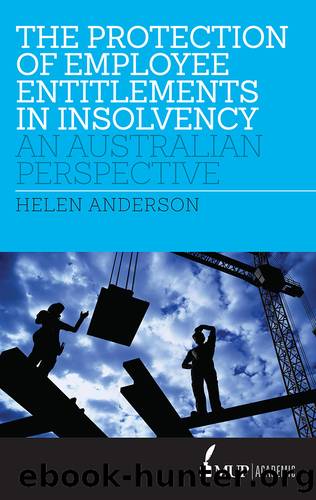The Protection of Employee Entitlements in Insolvency by Anderson Helen;

Author:Anderson, Helen;
Language: eng
Format: epub
Publisher: Melbourne University Publishing
Published: 2014-02-12T00:00:00+00:00
6 The Labour Law Response
Introduction
Chapter 5 discussed how provisions of the Corporations Act 2001 (Cth) (Corporations Act) formed a basis for action against directors who had not paid the employees of their insolvent companies their due entitlements. This chapter takes a different perspective and looks at the various means by which labour laws can be used to pierce the corporate veil to prosecute, or impose personal liability upon, directors or persons involved as accessories in an employer companyâs failure to pay worker entitlements. This is particularly important in the insolvency context because proceedings against a company in liquidation are stayed,1 and in the absence of another party to sue, no remedy in favour of employees will be forthcoming. The Fair Work Act 2009 (Cth) (Fair Work Act) was not designed as an entitlements-protection mechanism in the event of corporate insolvency. However, in the absence of active prosecution of Corporations Act breaches for lost employee entitlements, labour law may be seen as a viable alternative for their recovery, as well as being perhaps a more appropriate and worker-friendly jurisdiction.
Under both the Fair Work Act and its predecessor, the Workplace Relations Act 1996 (Cth) (Workplace Relations Act), there is clear provision for the making of penalty and compensation orders against the employer company for a wide range of contraventions. In addition, as the sections below will show, penalties can be ordered against company controllers as accessories to company breaches of the Fair Work Act. However, as this book is concerned with insolvent employers and the protection of employee entitlements, what is of primary concern here is the recovery of compensation from those solvent accessories for the benefit of employees. This, unfortunately, is not straightforward.
Compensation for lost employee entitlements might seem irrelevant given the availability of the General Employee Entitlements and Redundancy Scheme (GEERS) or the Fair Entitlements Guarantee (FEG), but a compensation order operates as effectively as the imposition of a fine in terms of both specific and general deterrence from breaches of the law.2 The penalty amounts applicable to various breaches of the relevant labour laws are relatively low,3 whereas an order for compensation has the capacity to reflect exactly the extent of the damage done.4 This chapter begins by exploring the provisions of the Fair Work Act that address penalties and compensation orders for breaches by accessories. It then considers litigation undertaken by the Fair Work Ombudsman (FWO)5 before looking at the efforts of unions on behalf of employees. Finally, it looks briefly at two particular labour law issues for workersâtransfer of business and sham contracting. Note that the chapter does not enter the debate about the appropriateness of labour law enforcement by either trade unions or regulatory agencies.6
Download
This site does not store any files on its server. We only index and link to content provided by other sites. Please contact the content providers to delete copyright contents if any and email us, we'll remove relevant links or contents immediately.
| Anthropology | Archaeology |
| Philosophy | Politics & Government |
| Social Sciences | Sociology |
| Women's Studies |
The Secret History by Donna Tartt(18272)
The Social Justice Warrior Handbook by Lisa De Pasquale(11970)
Thirteen Reasons Why by Jay Asher(8494)
This Is How You Lose Her by Junot Diaz(6478)
Weapons of Math Destruction by Cathy O'Neil(5874)
Zero to One by Peter Thiel(5521)
Beartown by Fredrik Backman(5389)
The Myth of the Strong Leader by Archie Brown(5256)
The Fire Next Time by James Baldwin(5044)
How Democracies Die by Steven Levitsky & Daniel Ziblatt(4982)
Promise Me, Dad by Joe Biden(4921)
Stone's Rules by Roger Stone(4882)
100 Deadly Skills by Clint Emerson(4715)
A Higher Loyalty: Truth, Lies, and Leadership by James Comey(4579)
Rise and Kill First by Ronen Bergman(4563)
Secrecy World by Jake Bernstein(4422)
The David Icke Guide to the Global Conspiracy (and how to end it) by David Icke(4416)
The Farm by Tom Rob Smith(4340)
The Doomsday Machine by Daniel Ellsberg(4268)
